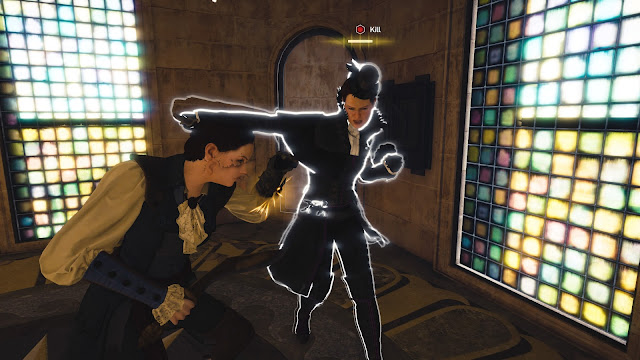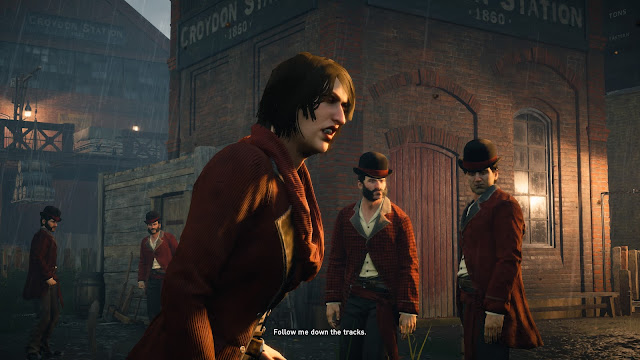THE HIDDEN BLADE OF THE FRANCHISE
Assassin’s Creed is back with its ninth mainline entry, set in the most modern historical period the series has tackled so far. And finally—dare I say it—Ubisoft delivers an entry with assassin mechanics solid enough to truly function as a sandbox. Roaming Victorian-era London is a joy, from the industrial brick factories lining the Thames to the elegant manors and castles of the posh West End, safely removed from the rowdy working-class districts.
With eight games behind me, I slip into the role effortlessly. I scale a towering factory chimney to secure a vantage point, spotting gang hideouts and Templar strongholds scattered across the district. From there, I zipline between rooftops in quick succession, dismantling them in my own—more or less creative—fashion. A silent war is brewing in this proud city, and I am its instigator. For once, Assassin’s Creed makes me feel almost like a superhero in a refreshingly liberating open-world experience.
The world itself is as immersive as ever. Streets bustle with ordinary citizens, horse-drawn carriages, gangsters, and policemen. Children are exploited as factory labor. Boats glide down the polluted river, unloading suspicious cargo at every pier. Bars stay open all night, and the city overflows with collectibles, historical landmarks, and small environmental stories. London feels alive, reactive, and full of possibilities.
The dynamic string-based soundtrack captures the cultural sophistication of an era when the British Empire stood near the height of its power. Even dockworkers and gang members dress with striking flair. Yet beneath the elegance, the music often hints at something darker—corruption and manipulation lurking behind the polished façade.
This time around, you play as twins Jacob and Evie Frye, marking the series’ first dual protagonists. You can switch freely between them, leveling each individually, though most main missions are character-specific. Alternating between two protagonists in a third-person action-adventure is unusual, but it works surprisingly well.
That said, the twins are mechanically quite similar. Canonically, Jacob favors brawling while Evie leans toward stealth, but in practice you can build them however you like. Each has a handful of unique late-game skills, none of which significantly alter gameplay. Personality-wise, both are rebellious in different ways—Jacob hotheaded and impulsive, Evie more thoughtful and composed.
With the help of the underdog Assassin Brotherhood, the Fryes challenge the tyrannical rule of Templar leader Crawford Starrick. He’s a memorable villain: gloomy, self-important, impeccably groomed, and sporting an impressive mustache. A man of culture who genuinely reveres a good cup of tea, Starrick takes himself far too seriously—which makes him all the easier to offend. Interrupt his dreadful singing performances at your own peril.
Wrapped in this evocative setting, I find myself completing long chains of side activities—not out of narrative obligation, but because the mechanics finally support experimentation rather than punishment. I set traps by stacking unconscious enemies beneath hanging crates, then shooting the rope to crush unsuspecting guards. I capture wanted criminals alive, and casually escort them into horse-drawn carriages, before delivering them to the police for a generous reward.
Much of this unfolds within an optional gang warfare storyline involving Templar takedowns, bounty hunts, child labor rescues, and gang hideout takeovers. You can invest heavily in sabotaging enemy supply lines and strengthening your own gang, the Rooks. Money also goes toward new weapons, outfits, and upgrades for your various satchels.
Your gang plays a major role in combat, which is frantic, violent, and gleefully chaotic—blades flashing, guns firing, hats flying, and blood splattering everywhere. Getting smacked in the forehead by a baton-wielding policeman never fails to make me laugh. Even though combat boils down to fairly simple button-mashing, it remains entertaining thanks to its exaggerated animations and slapstick flair.
Structurally, the game reminds me of the joy I found in titles like Just Cause 2, Middle-earth: Shadow of Mordor, and Mad Max. Much of the content is optional, and while Syndicate doesn’t reach the mechanical heights of those games, it delivers a similar brand of moment-to-moment fun.
This surprised me. In the past, when Assassin’s Creed loosened its reins and emphasized freeform assassination, the series often stumbled. Parkour felt unreliable, combat either clumsy or trivial. With Syndicate, Ubisoft finally finds a satisfying balance between solid mechanics, difficulty, and character progression.
Low expectations certainly helped. Syndicate received lukewarm reviews and disappointing sales at launch, with both critics and players suffering from franchise fatigue. Ubisoft responded by abandoning the annual release schedule and overhauling the series’ design philosophy. That decision feels ironic, because Syndicate represents the series’ peak in pure assassination gameplay. (That said, I still enjoy the pirating fantasy of Assassin’s Creed IV: Black Flag even more.) Just as Ubisoft got it right, they moved on. To me, this is the most underrated entry in the franchise.
Early on, you’re given a grappling gun that lets you scale vertical surfaces almost instantly, then fire another line to zip across wide streets. (Don’t ask where all that rope comes from.) Does this undermine parkour? Not really. You can still climb manually, but London’s broad, horse-friendly streets make traditional traversal awkward. The grappling hook is a welcome quality-of-life improvement—and one I sorely miss in other entries.
Syndicate is far from perfect. Horse controls feel slippery and imprecise in tense situations, like trying to juggle wet soap bars while fishtailing through traffic. The story and characters are also weak overall, and lore enthusiasts won’t find much to chew on here. That does make the systemic side content easier to enjoy, but it limits the game’s emotional or thematic depth. It’s shallow—but undeniably fun.
The modern-day Abstergo framing story once again adds little. Reduced to a handful of cutscenes, it feels vestigial. Newcomers might wonder why it’s even there. In short: an Assassin agent tasks you with exploring Victorian London via the Animus to locate the Shroud of Eden before the Templars do.
Narratively, the stakes never rise. Mission design, however, shines. Building on Assassin’s Creed: Unity, main missions offer multiple approaches and optional assassination methods. Planning, observation, and creativity are consistently rewarded. In one early mission, you infiltrate a lecture hall by posing as a corpse beneath a blanket—only to dramatically reveal yourself mid-lecture, to the horror of both target and audience.
The game encourages careful planning. Using Eagle Vision to track enemies through walls, you can decide exactly when and how to strike. Syndicate assembles one of the most effective assassin toolkits in the series. Berserk darts igniting fires create toxic clouds that send groups into chaos, while knives and smoke bombs are devastating when used thoughtfully.
A generous number of side missions—featuring historical figures like Charles Darwin, Karl Marx, and a young Arthur Conan Doyle—extend the experience further. Late-game missions offered by a prolific side character (whom I won’t spoil) push things even further. They’re tough, strictly timed, and occasionally frustrating—but I finished them anyway. I almost never play past the credits, which says a lot about how much I enjoyed the gameplay.
Despite yet another disappointing Abstergo conclusion, I rank Assassin’s Creed: Syndicate among the franchise’s strongest entries—probably third overall. Its poor sales likely stemmed from its predecessor’s reputation rather than any inherent flaw. Players invested in the overarching narrative may be left unsatisfied, but mechanically, this is Assassin’s Creed at its most enjoyable.
Syndicate rekindled my fading enthusiasm for the series, much like AC II and Black Flag did before it. The next entry, Assassin’s Creed: Origins, would take the franchise in a radically new direction, embracing open-world RPG mechanics. I welcome evolution—but if I ever feel the urge to revisit classic Assassin’s Creed gameplay, this is the entry I’ll return to.











Comments
Post a Comment